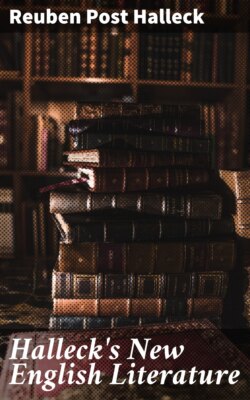Читать книгу Halleck's New English Literature - Reuben Post Halleck - Страница 29
На сайте Литреса книга снята с продажи.
SUMMARY
ОглавлениеThe period from the Norman Conquest to 1400 is remarkable (1) for bringing into England French influence and closer contact with the continent; (2) for the development of (a) a more centralized government, (b) the feudal system and chivalry, (c) better civil courts of justice and a more representative government, Magna Charta being one of the steps in this direction; (3) for the influence of religion, the coming of the friars, the erection of unsurpassed Gothic cathedrals; (4) for the struggles of the peasants to escape their bondage, for a striking decline in the relative importance of the armored knight, and for Wycliffe's movement for a religious reformation.
This period is also specially important because it gave to England a new language of greater flexibility and power. The old inflections, genders, formative prefixes, and capability of making self-explaining compounds were for the most part lost. To supply the places of lost words and to express those new ideas which came with the broader experiences of an emancipated, progressive nation, many new words were adopted from the French and the Latin. When the time for literature came, Chaucer found ready for his pen the strongest, sincerest, and most flexible language that ever expressed a poet's thought.
In tracing the development of the literature of this period, we have noted (1) the metrical romances; (2) Geoffrey of Monmouth's (Latin) History of the Kings of Britain, and Layamon's Brut, with their stories of Lear, Cymbeline and King Arthur; (3) the Ormulum, a metrical paraphrase of those parts of the Gospels used in church service; (4) the Ancren Riwle, remarkable for its natural eloquent prose and its noble ethics, as well as for showing the development of the language; (5) the lyrical poetry, beginning to be redolent of the odor of the blossom and resonant with the song of the bird; (6) the Handlyng Synne, in which we stand on the threshold of modern English; (7) Mandeville's Travels, with its entertaining stories; (8) Wycliffe's monumental translation of the Bible and vigorous religious prose pamphlets; (9) Piers Plowman, with its pictures of homely life, its intense desire for higher ideals and for the reformation of social and religious life; (10) Gower's Confessio Amantis, a collection of tales about love; and (11) Chaucer's poetry, which stands in the front rank for the number of vivid pictures of contemporary life, for humor, love of nature, melody, and capacity for story-telling.
